Psoriasis is a chronic, non-infectious, inflammatory skin lesion that negatively affects patients' quality of life (Greek "Psora" scale). From here, like many other diseases, the first observation of psoriasis is described. This term was introduced by Galen, one of the key researchers in medicine.
The skin signs of psoriasis have caused confusion among both people and doctors, as leprosy was widespread at the time, with serious consequences. Patients with psoriasis were put under social pressure, avoided, and forcibly isolated. In Europe, such people have been forced to ring bells to warn others of their arrival. Manure, onions, sea salt, oil, and urine were used during treatment, but all of these were ineffective and expelled patients with psoriasis.
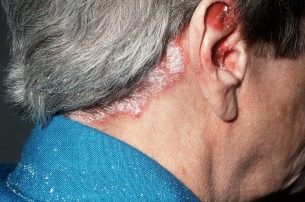
PREVENTION OF PSORIASIS
The disease can occur at any age, but is more common in the 49-69 age group. The reported prevalence of psoriasis in countries ranges from 0, 09% to 11, 4%, making psoriasis a serious global problem.
Although it is widely believed that psoriasis is not as severe as other non-dermatological conditions, psoriasis creates a burden of disease that goes far beyond dermatological symptoms. Its psychological effects are similar to cancer, heart disease, diabetes. Plaques of psoriasis are often seen that can negatively affect interpersonal relationships, school or work success. Not surprisingly, people with psoriasis have a higher rate of depression as the number of suicidal thoughts increases.
Patients with psoriasis are also at risk of developing severe comorbidities that complicate disease control and increase the risk of premature death. Cardiovascular disease and metabolic syndrome are more common in patients with psoriasis.
In addition, psoriasis itself is a risk factor for cardiovascular disease, tripling the relative risk of developing a heart attack. Severe psoriasis is also associated with an increased risk of death, resulting in a reduction in life expectancy of 3, 5, and 4, 4 years for men and women, respectively, compared to people without psoriasis.
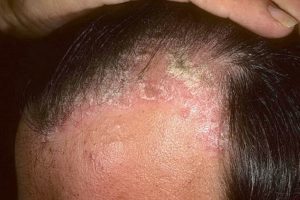
CAUSE OF PSORIASIS ON THE HEAD
There are several theories about the origin of psoriasis. This is microbes, viruses, allergies, poor hygiene, disrupted blood supply to the skin, disruption of the functional balance of internal organs, and one of the most urgent at the moment - the autoimmune nature of the disease when human immune cells attack their own tissues. And even this assumption remains a theory, as no skin-damaging antibodies have been found in patients with psoriasis to date.
The cause of the pathology is currently unknown. But research has identified factors that can trigger the development of psoriasis with some likelihood.
The following points are distinguished:
- Inheritance. There is no one hundred percent chance that if both mother and father are ill, their child will necessarily suffer from psoriasis. But in such a situation there is a higher risk of developing such a pathology. It was also noted that if one of the same twins is sick, the second twin is more likely to get sick than compared to the usual risk in the population. This proves that this nosology has a genetic precondition.
- Skin injuries: accidental knife cuts, cat scratches, mosquito bites, sunburns increase the risk of another epidemic.
- Infections: staphylococcus, streptococcus and other infections can also be triggers. Children often suffer from streptococcal tonsillitis before the onset of psoriasis of the skin.
- There are medications that can trigger the disease, such as medications for malaria, some medications for depression.
- Changing your HIV status to positive can also boost the development of psoriasis. Therefore, testing for HIV when psoriasis is suspected is not strange.
- Stress. The most famous trigger of the laity. “It’s all because of the stress” - every patient with psoriasis has heard the term at least once. There are those who question this term, but there is a justification for it. Scientists believe that our immune system is able to respond to emotional and mental pressure, as well as physical defects such as trauma and infections.
- Being overweight severely negatively affects the entire body, and if an obese person has psoriasis, treatment is more difficult and often less effective.
- Smoking. It has long been noted, and it is no secret to anyone, that cigarettes negatively affect the condition of the skin. Therefore, the likelihood of provoking psoriasis, especially the head and hands, is injured.
- Alcohol is a common individual cause of psoriasis.
- Hormonal changes. The disease often manifests itself during puberty. Menopause can also trigger psoriasis, but a decrease or even complete regression of plaques can be seen during pregnancy.
SYMPTOMS OF PSORIASIS ON THE HEAD
In 50% of cases, psoriasis is felt in the head. Psoriasis can appear anywhere on the head. Sometimes tiny plaques form that can be easily hidden in the hair, but when the entire scalp is covered, it is difficult to hide the plaque.
The appearance of psoriasis on the head will look like this:
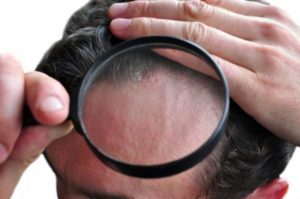
- Reddish spots on the scalp. Some spots are barely visible due to fading, but there are also bright red elements that are easy to see.
- Scales detached from psoriasis. The condition of the scalp in this pathology may be similar to normal dandruff. But there are differences, so psoriasis, for example, has a silvery shine and can be accompanied by itchy skin.
- Dry scalp. The scalp can be so dry that the skin ruptures and bleeds, creating conditions for the addition of an infection that has some difficulty treating in such localization.
- Itching. This is one of the most common symptoms. Someone experiences a mild itching that the patient may forget about in their daily activities, and there are severe itchings for which work, study, and sleep are also impossible.
- Bleeding. Because psoriasis of the scalp can be itchy, the patient can scratch the skin, damaging it. In addition to bleeding, scratching can worsen the course of psoriasis by making the plaque bigger and denser. That's why dermatologists tell their patients, "Try not to injure your scalp. "
- Burning. The patient’s scalp can literally be called “burning”.
- Hair loss. Scrubbing the scalp using force to remove scales can lead to hair loss. Although this phenomenon is temporary, it can still cause discomfort to the patient.
These clinical manifestations may increase and collapse rapidly. This is an individual process. In one patient, the entire pathological process ends in one pale plaque under the hair, while the other has many bright lesions all over the head. This is influenced by, among other things, the triggers described above.
There are several issues a patient may face:
- Skin appearances visible to others. Life with psoriasis can be shy. Any aspect of social life can be stressful for them, such as holding hands on a date.
- Finance. Treating psoriasis can be costly. This is more the case with widespread psoriasis, which is resistant to conventional therapy and is treated with new drugs based on monoclinic antibodies.
- Pain. Chronic pain can occur with psoriasis, which further increases stress levels. This is especially true when skin manifestations are accompanied by inflammation of the joints while reducing a person’s daily activity.
- Healing. Especially when the patient seeks help late, some procedures do not bring the expected effect, which of course worries the patient, suppresses them emotionally. Other procedures can take a long time. For example, you may need to receive phototherapy three times a week for a year. For some, it will be difficult to reconcile such a system with a normal rhythm of life.
- Living with a chronic illness. Psoriasis, like many other chronic diseases, requires a great deal of willpower. It is difficult for the patient, especially in the initial stages, to cope with a number of additional problems that have “fallen on his head”. This creates the conditions for depression to occur.
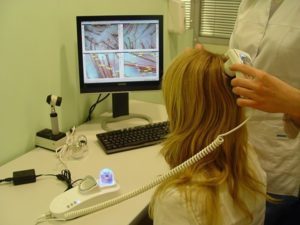
PSORIASIS DIAGNOSTICS ON THE HEAD
Depending on the severity of the symptoms, it is up to the patient to decide whether or not to see a doctor. However, the best solution, regardless of the location of the plaques, would be to see a doctor. For further treatment to be as effective as possible, an accurate diagnosis must be made, even if the symptoms are mild.
In most cases, scalp psoriasis is diagnosed after a physical examination and analysis of the medical history.
A dermatologist can determine psoriasis of the scalp by examining abnormal elements of the skin.In exceptional cases, the patient may be advised to have a skin biopsy to rule out other conditions.
TREATMENT OF PSORIASIS ON THE HEAD
Unfortunately, there is currently no cure for this disease. Therapy is necessary throughout life and is aimed at maintaining remission. In addition, the care of patients with psoriasis requires not only skin treatment, but it is also very important to control existing chronic diseases and prevent the appearance of new ones.
These diseases include cardiovascular disease, metabolic diseases, and psychological health.
Management goals:
- Achieve clinical recovery of the patient as soon as possible;
- Remission must be stable and long-term;
- Maintaining a positive psychological state of the patient.
TWO FOOD
Treatment traditionally begins with diet. Foods that contain antioxidants such as vitamin C, vitamin E, beta-carotene (vegetables, fruits, sage, ginger, and others) and omega-3 fatty acids, which are rich in salmon, sardines, and other fish, can play a positive role.
The link between alcohol and psoriasis is unclear, but experts say drinkers are less responsive to treatment and psoriasis remissions are longer after they stop drinking. In addition, some antipsoriatic drugs are not compatible with alcohol.
There is a clearer correlation than being overweight. In obese people, the pathology usually progresses faster with a clearer clinical picture.
SHAMPOO
Hair makes it especially difficult to treat scalp psoriasis. Rarely will someone agree to have their hair removed in order to deal more effectively with the clinical manifestations of the disease, especially given the fact that the defects will become even more noticeable to others.
Traditional hair care products are not suitable in this situation as they can further irritate the scalp, contributing to the progression of the pathology. Therefore, tar shampoos are used, the effectiveness of which in the fight against scalp psoriasis has long been noticed.
Tarhas a "soothing" effect on the epidermis of the scalp, inhibiting the formation of scales. In addition, shampoos with phenolic acid are also used because they have a keratolytic effect (they destroy dense horny scales). Plus is used to increase the penetration of other drugs, including corticosteroids.
When prescribing shampoo, the individual characteristics of the person living with hair hygiene are taken into account. For example, some women do not wash their hair every day, so it would be best to apply it to their hair 2-3 times a week before going to bed and then wash their hair in the morning.
PHENOLIC ACID
Phenolic acid can be used alone as an ointment. The fact that the ointment has been used for a relatively long time increases the effectiveness of the hyperkeratic properties. For patients who complain of difficulty separating the scales from their hair, applying the ointment before showering can help resolve this situation.
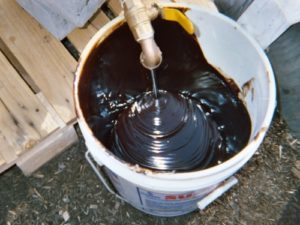
WEAK
Coal tar has been used for decades to treat psoriasis due to its antiproliferative, anti-inflammatory and potent antipruritic effects.
Although raw coal tar is the most effective resin. Applying raw stone tar to the scalp is problematic. Generally, the use of a resin solution (5-20%) is recommended as a cream or added to a corticosteroid. This cure helps fight psoriasis, but it has a number of side effects: coloring, thinning hair, and a more severe negative effect — a carcinogen that makes the use of this method limited.
This is why, for example, coal tar is banned in Canada and the European Union.
CORTICOSTEROIDS
Of all the topical treatments available, corticosteroids have been shown to be the most effective in clinical trials for scalp psoriasis and are the most commonly prescribed treatments. Corticosteroids are also convenient because there are a large number of forms of preparation in all situations: creams, creams, ointments, oils, gels, foams, solutions, sprays and shampoos.
Do not underestimate the importance of psychological harmony in this pathology. Stress can both become a trigger, causing a detailed clinical picture, and slow down the treatment process. Therefore, patients with internal anxiety are advised to consult a psychotherapist, psychologist.
SUGGESTIONS FOR RECOMMENDATIONS FOR HEAD PSORIASIS
It is important for a patient with psoriasis to follow your doctor's advice first, but you can still improve your quality of life by following the simple rules below:
- Use moisturizers. The skin manifestations of the disease are noticeably worse when the skin is dry, so it is important that the skin stays moist. Special cosmetic ointments, body lotions or, for example, regular Vaseline can help with this.
- Take care of your skin with psoriasis plaques. When washing your hair, never forcibly pull out a scale that is tight to your skin, as you can only spread the process to nearby, healthy tissues.
- Be careful when cutting your nails. Cases have been described where accidental damage to the nail growth zone with manicure scissors has caused the appearance of new skin elements.
- Find the right shampoo for you that won’t flocculate your skin and you can use it on your scalp in remission. Or just continue to use tar, only at a lower concentration, for daily care.
- Climate can also play a role. It has been noticed that the cold has a negative effect on patients, provoking the formation of plaques. Sunny weather causes regression of skin manifestations, but not always.
- Use a humidifier. This can keep the skin moist and eliminate dry air, which is bad for patients with psoriasis.
- Do not take medicines that can damage your skin. Your doctor should be informed of any medicines you take, even those that you think are harmless. For example, compositions containing lithium salts can be used to treat depressive conditions, which are contraindicated in patients with psoriasis.
- Avoid any damage to the skin: scratches, cuts, bumps. Damage to the skin can cause a condition called Koebner (where the elements of psoriasis develop along the damage to the skin). Be careful when shaving. Try to avoid acupuncture, avoid tattoos on your body, and do everything you can to prevent insect bites.
- Try to appear in the sun, but in moderation. Ultraviolet rays in sunlight slow down the growth of skin cells, so it is good to achieve a moderate UV dose (30 minutes at a time is enough). Paradoxically, excessive sun exposure can provoke psoriasis. Also keep in mind that certain medications can make your skin more sensitive to UV rays.
- Patients with psoriasis should reduce their levels of anxiety. Of course, this is easier said than done, but relaxation techniques such as meditation or yoga can be tried.
- Estimate how much alcohol you consume. The link between alcohol and psoriasis is not clear, but scientists still believe it could worsen symptoms, especially in men. It is well known that alcohol in combination with certain psoriasis medications is dangerous.
- Balance your diet and try to lose weight. If you find it difficult to do this, get help from professionals who can assess which direction you should work in better.

HEAD RECOMMENDATIONS FOR CHECKING PSORIASIS STATEMENTS
By monitoring the progress of psoriasis, you can help the patient better control his or her disease and take the necessary action in a timely manner, as well as increase the productivity of the doctor-patient relationship. Here are some simple rules to help:
- Take a “self-portrait” of a psoriasis epidemic. A digital camera, smartphone, or just a piece of paper will help you do this, where you can record all the changes that happen with the whiteboards. It is also worth noting where the changes appear initially and in what order they increase. For such self-monitoring, your doctor will only praise you and know that you are determined. Over time, patterns can be identified by analyzing the recordings, for example, an epidemic always begins with plaque at the nape of the neck.
- Every time your psoriasis recedes or progresses, try to find out what it is. Maybe the weather has changed? Out of medicine? Are you taking a new medication? Recently damaged skin? Such triggers can be unique, making it difficult for the physician to understand without self-examination of the patient (e. g. ,
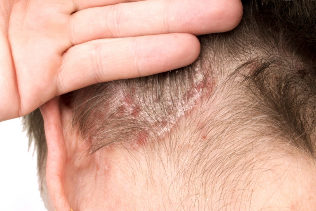 an attack provokes certain types of coffee).
an attack provokes certain types of coffee).
Although the disease does not spread through contact, the appearance of patients deters those who do not know it. Beauty salons are afraid to provide service, some taxi drivers do not want to transport such people, it is difficult to get a job. Not to mention starting a family, and the fear that their children will be doomed to the same suffering prevents them from having children.
There have also been cases where people with psoriasis have been denied training in the Olympic Swimming Reserve following collective complaints from other athletes. Management had to reject such people, even though they fully understood that this pathology was not dangerous in an infectious sense.
Everyday, everyday activities are difficult for them because the burden of psychological pressure is high and people need social connections. For these reasons, patients with psoriasis are shaping protection and support communities in many countries. Businesses are being set up to educate outsiders about this disease.
People should be judged by their actions, not by their appearance. In fact, patients with such nosology include highly professional doctors, police officers, firefighters, athletes, and many others whose actions not only their relatives but also their country can be proud of.























